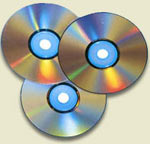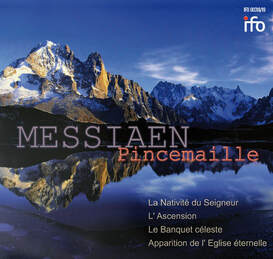The first thing that you notice about this pair of CDs is that they come in a three-fold card case. It is only when you try to read the beautifully laid-out booklet that you find it is rather irritatingly glued to the case, and the details about the organ are only in German. My vestigial German worked out that the organ uses pipework from the previous instrument by Danion-Gonzales, built in 1970. It is a pity that the case is merely a pipe-rack.
I want to be as fair to this recording as I can, and it has to be said that it is truly virtuosic playing. But the main thing about this recording is the speed. Even when M Pincemaille is slower than other recordings (which doesn't happen often) there's no leisure to enjoy some fruity passage before he launches into the next. I would like it to breathe more, to let the acoustic have its way with the music. I was also slightly irritated by the rubato in Dieu parmi nous. However, the clarity of the recording revealed to me a misreading I have been playing for years in l'Ascension, and that is a very strong point about these CDs. That said, I won't abandon Louis Thiry's incomplete set on Calliope.
The blurb about the performer, M Pincemaille, extols his virtuosity and registrational originality. It is a feature of Messiaen's music that he tells the performer exactly which stops to use, ranging from the perfectly ordinary (fonds 8 & 4) to - for a melody on the pedal - Bourdon 32 & 2. The organ chosen for the recording lacks several of the stops specifically requested by Messiaen, namely the famous Saint-Trinité 16' Quintaden on the Positif and numerous flûtes, harmonic and otherwise, which appear on every romantic Cavaillé-Coll or Mutin built since about 1850. A severe lack of some of the colourful “raindrop” stops for the Banquet is also a shame. But otherwise the organ is certainly up to the job, with the characteristicly French blaze of reeds. The Chamades do rather bounce around the ears (the recording is close enough to give you C and C# sides very clearly on the chamades) which, on headphones in Transports de joie is disconcerting. What it must be like for the performer...
It occurred to me though, that omitting the Banquet (which at this speed resembles fast food) would have meant that it would all have gone onto one CD.
It occurred to me though, that omitting the Banquet (which at this speed resembles fast food) would have meant that it would all have gone onto one CD.
Philip Bailey - December 2009 –



